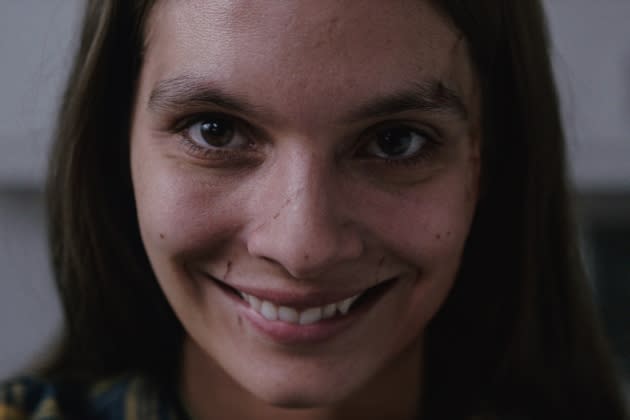‘Smile’ Is Pure, Uncut Arthouse Horror With a Grin (and a Killer Gimmick)

You have to admire a commitment to a bit, especially if you’re a film like Smile and in the possession of a simple, genius, creepier-than-thou conceit. Let’s cut to the chase: Dr. Rose Cotter (Sosie Bacon) is a therapist working in the psychiatric wing of a hospital. A patient comes in and says that, even since she witnessed her college professor take his own life, she’s been seeing…something only she can see. “It’s not a person,” the young woman says, though whatever “it” is, the entity seems to take the appearance of both strangers and loved ones. “It’s like it wears people’s faces like masks.” She hears voices, too — and these voices have been telling her that she’s going to die very soon.
Then the screaming starts. She falls on the floor, writhing in pain and pointing at something behind the doctor, though there doesn’t appear to be anybody else in the room with them. Rose rushes to the phone on the wall and calls security. When she turns back around, the patient is standing up…and smiling. In fact, her mouth appears to be stuck in the most horrific rictus grin you’re likely to see. Then the woman kills herself in front of the doctor. And then, a day or so later, Rose starts to notice a number of people sporting that exact same smile, looking right at her, informing her that “you’re next”….
More from Rolling Stone
'Catherine Called Birdy' Is the Family-Friendly Feminist Medieval Comedy We Needed, and So Much More
'Barbarian,' 'Pearl,' and Why It's a Great Moment to Be a Horror Fanatic
'Athena' Doesn't Want to Start an Uprising -- It *Is* an Uprising
Such psychotically joyful, genitive dentis maximus expressions have always had the potential to give folks the heebie-jeebies (see: Conrad Veidt in The Man Who Laughs, the Joker, Tom Cruise during a press tour). Few movies have used them better or relied on them more heavily than writer-director Parker Finn’s debut feature, however, and it’s to the movie’s credit that it doesn’t overplay its hand — or rather, its killer kisser — while still milking the unnerving sight for all its worth. The more a clearly unnerved Rose witnesses normal scenarios turn into Cheshire-Cat nightmares, the more you want to crawl out of your own skin. And though Finn has a facility with jump scares, slow-burn dread and the sort of sonic dissonance that suggests something wicked this way is already here (both composer Cristobal Tapia de Ver and the entire sound design team deserves bonuses), it’s the pop-up utilizations of that grin that proves to be his most effective weapon. Old, young, background players, famous people, Deadwood alumna like Robin Weigert, one half of Harold and Kumar (Kal Penn plays Rose’s direct supervisor): it doesn’t matter. The Smile is the constant. It’s both the North Star and the movie star here.
It’s also part of a curse, you see, that gets passed from one person to the next. Why this particular curse announces its presence via a unnervingly happy, extremely toothy expression remains a riddle. The Smile was never burned to death by angry parents in a boiler room, or came back after drowning because camp counselors were too busy making out, or plagued people because a demonic artifact was unearthed in Iraq, or crawled out of TV thanks to a static-y videotape. The Smile does not need an origin story. It simply is the manifestation of a viral evil that jumps from host to host, stretching the lips of a victim’s ghostly tormentors — and, eventually, those belonging to the unlucky soul being tortured as well — so far it appears their heads with horizontally cleave itself in half.
What we do know is that this thing thrives on people witnessing something that leaves a psychic scar, thus turning Smile into one big elaborate metaphor for the impact of trauma on daily lives; should you think that’s some eggheaded reading of a genre movie, a character literally says, “This thing thrives on trauma” at one point. Rose’s ex (Kyle Gallner), who happens to be a cop, helps her trace the lineage of that hospital patient back to her trauma, which is connected to a seemingly endless series of suicide-freakout-rinse-repeat. The only survivor of this chain-letter equivalent of self-annihilation is a prisoner (Rob Morgan) who found a loophole by killing someone in front of another person, and even he remains permanently shook years later. It’s not a surprise that Rose eventually ends up facing down this thing in her childhood home, i.e. the site of her own original-sin trauma, with the hopes of healing herself in order to rob this monstrosity of its power. Rarely has an extended metaphor turned into such a final-boss-battle grotesquerie.
The one thing that truly is surprising in Parker’s impressive first movie — here’s hoping that there are many more to come — is the studio logo that opens it. He’s made a scary movie that balances psychological shock therapy with old-fashioned fright, shadowy dread with blunt splatterfest FX, an artsy-fartsy sense of stylistics slapped on to a twisty B-movie scenario. It may open with Paramount name slapped on the beginning, but this is textbook A24 horror by any other name. A cynic might think this is another example of a corporate behemoth trying to suck the life blood out of a successful formula concocted in an indie-boutique lab, but we prefer to think of it as spreading the arthouse-spookiness gospel via different avenues. Curses get passed on like viruses. So do blessings.
Best of Rolling Stone
Click here to read the full article.